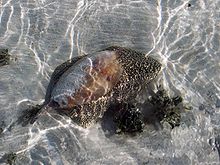
A melon is any of various plants of the family Cucurbitaceae with sweet edible, fleshy fruit. The word "melon" can refer to either the plant or specifically to the fruit. Botanically, a melon is a kind of berry, specifically a "pepo". The word melon derives from Latin melopepo, which is the latinization of the Greek μηλοπέπων (mēlopepōn), meaning "melon", itself a compound of μῆλον (mēlon), "apple, treefruit " and πέπων (pepōn), amongst others "a kind of gourd or melon". Many different cultivars have been produced, particularly of cantaloupes.

João Cabral de Melo Neto, was a Brazilian poet and diplomat, and one of the most influential writers in late Brazilian modernism. He was awarded the 1990 Camões Prize and the 1992 Neustadt International Prize for Literature, the only Brazilian poet to receive such award to date. He was considered until his death a perennial competitor for the Nobel Prize in Literature.

Łukasz Kubot is a Polish professional tennis player. Kubot is a doubles specialist and won the 2014 Australian Open men's doubles title with Robert Lindstedt as well as the 2017 Wimbledon men's doubles title with Marcelo Melo. On January 8, 2018 he achieved a career-high doubles ranking of World No. 1. He has also had success in singles, achieving a career-high singles ranking of World No. 41 in April 2010 and reaching the quarterfinals of the 2013 Wimbledon Championships. In 2013 he was awarded the Gold Cross of Merit by Polish President Bronisław Komorowski.

Volutidae, common name volutes, are a taxonomic family of predatory sea snails that range in size from 9 mm to over 500 mm, marine gastropod mollusks. Most of the species have no operculum.

Felipe Melo de Carvalho is a Brazilian professional footballer who plays as a midfielder for Palmeiras.

Marcelo Pinheiro Davi de Melo is a Brazilian tennis player. He is the younger brother of Daniel Melo and grew up in Belo Horizonte, Brazil. He stands at a height of 2.03 m.

Neoplanorbis is a genus of small, freshwater, air-breathing snails. They are aquatic pulmonate gastropod mollusks in the family Planorbidae, the ram's horn snails.
† Neoplanorbis umbilicatus was a species of air-breathing freshwater snail, an aquatic pulmonate gastropod mollusk in the family Planorbidae, the ram's horn snails.

Melo amphora, common name the Diadem volute, is a very large sea snail, a marine gastropod mollusc in the family Volutidae, the volutes.

Melo is a genus of extremely large sea snails, marine gastropod molluscs in the family Volutidae, the volutes. Because of their huge ovate shells, these snails are often known as "bailers" or "melons".

Melo melo, common name the Indian volute or bailer shell, is a very large sea snail, a marine gastropod mollusc in the family Volutidae, the volutes.

Melo aethiopica, common name the crowned baler, is a very large sea snail, a marine gastropod mollusc in the family Volutidae, the volutes.
Rolandiella umbilicatus is a species of sea snail, a marine gastropod mollusk in the family Muricidae, the murex snails or rock snails.
Rolandiella is a genus of sea snails, marine gastropod mollusks in the family Muricidae, the murex snails or rock snails.
Melo ashmorensis is a species of sea snail, a marine gastropod mollusk in the family Volutidae, the volutes.

Melo broderipii is a species of sea snail, a marine gastropod mollusk in the family Volutidae, the volutes.
Melo georginae is a species of sea snail, a marine gastropod mollusk in the family Volutidae, the volutes.

Thylactus is a genus of longhorn beetles of the subfamily Lamiinae, containing the following species:
Thylactus umbilicatus is a species of beetle in the family Cerambycidae. It was described by Karl-Ernst Hüdepohl in 1990.














